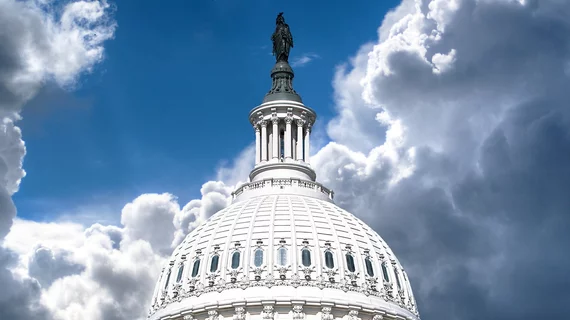Physicians want Congress to calm ‘deepening alarm’ over 2022 Medicare practice pay cuts
Physicians want Congress to address “deepening alarm” over Medicare pay cuts set to hit practices in 2022.
Those include the expiration of a temporary 3.75% increase in the physician fee schedule conversion factor to avoid reimbursement reductions tied to budget neutrality. Coupled with sequestration and other forthcoming changes, practices are facing a 9.75% pay cut on Jan. 1, the American Medical Association warned in a July 21 letter to leaders of the U.S. House and Senate.
AMA is asking Congress to alleviate these reductions and avoid paying for infrastructure projects with funds from providers still fighting the COVID-19 pandemic.
“On behalf of the physician and medical student members of the American Medical Association, I am writing to express our deepening alarm concerning the growing financial instability of the Medicare physician payment system,” CEO James Madara, MD, wrote Wednesday. “Not only does Congress seem indifferent to the confluence of fiscal uncertainties confronting physician practices at the end of this year, but lawmakers’ pursuit of policies to extend the current Medicare sequester that, in effect, will require physicians and health systems to pay for hard infrastructure amplifies our ongoing concerns.”
Both the American College of Radiology and Society of Nuclear Medicine & Molecular Imaging also recently highlighted proposed pay changes, with the latter expressing “dismay.” The rule would reduce the conversion factor from $34.89 down to $33.58, following the expiration of the 3.75% pay bump, a 0% conversion factor update and budget-neutrality adjustment.
AMA is asking lawmakers to convene hearings to address the “alarming” financial and operational state of the federal payment system. Madara and colleagues additionally cited concerns tied to the Medicare Access and CHIP Reauthorization Act. Many practices remain stuck in the Merit-based Incentive Payment System portion of MACRA, which is imposing steep administrative burdens without real clinical relevance.
“The state of the program is increasingly dysfunctional and, ultimately, it will be patients who suffer,” Madara wrote. “In the interim, the AMA strongly urges Congress not to divert increasingly scarce healthcare dollars for non-health care purposes, especially when there are so many uncertainties and current policies are already undermining the Medicare physician payment system.”

